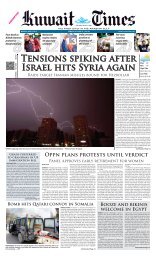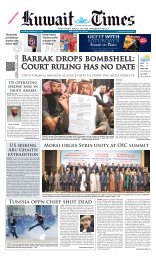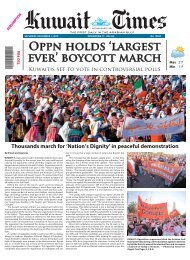NEw SARS-likE viRUS EMERGES iN MidEASt - Kuwait Times
NEw SARS-likE viRUS EMERGES iN MidEASt - Kuwait Times
NEw SARS-likE viRUS EMERGES iN MidEASt - Kuwait Times
You also want an ePaper? Increase the reach of your titles
YUMPU automatically turns print PDFs into web optimized ePapers that Google loves.
INTERNATIONAL<br />
Forest fire forces 2,000 to evacuate in Spain<br />
VALENCIA: Firefighters battled a forest fire<br />
whipped up by strong winds in the Spanish region<br />
of Valencia yesterday, forcing the evacuation of<br />
about 2,000 people, officials said. The blaze broke<br />
out Sunday afternoon and spread quickly, threatening<br />
villages about 50 kilometres (30 miles) inland<br />
of the eastern city Valencia, which lies on the<br />
Mediterranean coast.<br />
About 2,000 people have been evacuated from<br />
villages in the area since it broke out Sunday afternoon<br />
and several roads were cut off, Valencia officials<br />
said. Some 500 firefighters on the ground,<br />
backed by 27 aircraft, were attempting to get the fire<br />
under control, they said.<br />
“We are trying to protect areas of housing,” said<br />
senior Valencia region government policymaker<br />
Turkey clips military’s<br />
wings in landmark verdict<br />
Court jails more than 300 officers<br />
ISTANBUL: The jailing of hundreds of Turkish army<br />
officers including top generals accused of plotting<br />
to topple Prime Minister Tayyip Erdogan underscored<br />
how far he has come in gaining control of<br />
the country’s once all-powerful military.<br />
But Erdogan, 10 years in power, must grapple<br />
with suspicions among critics and even some sympathisers<br />
that he is using this and other coup investigations<br />
to silence opposition as he sets about<br />
taming a militant secularist establishment. Far from<br />
flinching, he may seek more power in a revamped<br />
presidency. The verdict against 325 officers at the<br />
end of the 21-month trial on Friday would have<br />
been unthinkable a decade ago, when generals<br />
regularly intervened in policy-making as selfappointed<br />
guardians of Turkish secularism.<br />
Judges in the case, dubbed Sledgehammer,<br />
handed down prison sentences ranging from six to<br />
20 years against the officers for plotting to wreck<br />
Erdogan’s rule almost 10 years ago, soon after his<br />
Islamist-rooted party swept to power with the<br />
biggest share of the vote in decades.<br />
Hilmi Ozkok, who was head of the armed forces<br />
at the time, rejected accusations the court’s decision<br />
was driven by revenge.<br />
“The ruling will serve as a deterrent and has a<br />
lesson for everyone ... in understanding how much<br />
Turkey and the rest of the world has changed,”<br />
Ozkok told Milliyet newspaper on Sunday.<br />
Turks reading such words from the mouth of the<br />
former armed forces chief will gain a measure of<br />
the scale of change since Erdogan’s AK party was<br />
first elected in 2002. The generals then made no<br />
secret of their disdain for a man who had served a<br />
brief prison sentence for relgious incitement and<br />
had backed a short-lived Islamist government they<br />
eased from power in 1997 When AK was elected for<br />
a second term in 2007 with an even larger margin<br />
of victory, an emboldened Erdogan launched a<br />
series of investigations into officers, lawyers, politicians,<br />
journalists and others that exposed several<br />
alleged conspiracies against the government.<br />
The plots consisted of plans to foment unrest<br />
and pave the way for an army takeover.<br />
Sledgehammer, a war game scenario played out at<br />
a barracks in Istanbul in March 2003, included plans<br />
to bomb historic mosques in Istanbul and trigger<br />
conflict with Greece. For many, it was all to easy to<br />
believe. Turkey’s military, NATO’s second biggest,<br />
staged three outright coups between 1960 and<br />
1980 and pressured a fourth government, the first<br />
Islamist-led, from power in 1997.<br />
ANKARA: Turkey’s Chief of Staff Gen. Necdet Ozel, left, and his Somalian counterpart Gen.<br />
Abdikadir Sheikh Ali Dini inspect guard of honour at the Turkish army headquarters in<br />
Ankara, Turkey, yesterday. — AP<br />
Under Erdogan, a devout Muslim, curbs on religion<br />
have been relaxed. Women are allowed to<br />
more freely wear the Islamic headscarf, alcohol is<br />
heavily taxed, and students at religious high<br />
schools are able to more easily attend university.<br />
Journalists complain of pressure to write<br />
favourable stories about the government, and a<br />
number of writers are among those arrested under<br />
another plot investigation, “Ergenekon”. “This<br />
(Sledgehammer) case is an important step towards<br />
ending the army’s political role but it’s not enough<br />
to stop it completely,” said Sahin Alpay, professor of<br />
political science at Bahcesehir University and a<br />
columnist for Zaman, seen as close to the government.<br />
“Now we need a new constitution and laws that<br />
place the army under civilian supervision and<br />
reform military schools to reflect the values of a liberal<br />
democracy,” he said. A new constitution is now<br />
under consideration to replace a restrictive code<br />
Sudan, S Sudan leaders meet<br />
for deal on conflict issues<br />
ADDIS ABABA: The presidents of Sudan and South<br />
Sudan met for a second day yesterday as pressure<br />
mounts to settle long-running bitter disputes that<br />
have brought the rivals to the brink of renewed conflict.<br />
Former civil war foes President Omar al-Bashir<br />
of Sudan and his Southern counterpart Salva Kiir are<br />
facing the looming threat of UN Security Council<br />
sanctions unless they reach a deal, after they missed<br />
a Saturday deadline.<br />
The protracted talks under African Union mediation<br />
began in the Ethiopian capital several months<br />
before South Sudan split in July 2011 from what was<br />
Africa’s biggest nation, following an independence<br />
vote after decades of war.<br />
The leaders met Monday for talks hosted by<br />
Ethiopian Prime Minister Hailemariam Desalegn in<br />
the presidential palace, alongside AU chief mediator<br />
and former South African president Thabo Mbeki.<br />
“The presidents met, now they are discussing<br />
issues,” including contested border areas and oil,<br />
said top South Sudanese official Deng Alor, as the<br />
leaders broke mid-morning for discusions with their<br />
own teams.<br />
Face-to-face meetings expected to resume later<br />
yesterday, Alor added. The pair kick-started the talks<br />
with a two-hour meeting late Sunday, following<br />
marathon efforts by rival delegations to close gaps<br />
on a raft of issues left unresolved when the South<br />
became independent last year.<br />
Little information has filtered out about progress<br />
of the meeting, but both leaders have been seen<br />
smiling and chatting in each other’s company.<br />
“There is still optimism some form of a deal can be<br />
settled,” said a Western diplomat.<br />
Key issues include the ownership of contested<br />
regions along their frontier especially the flashpoint<br />
Abyei region-and the setting up of a demilitarised<br />
border zone after bloody clashes.<br />
The buffer zone would also potentially cut support<br />
for rebel forces in Sudan’s Southern Kordofan<br />
and Blue Nile regions that Khartoum accuses Juba<br />
of backing. The UN set a deadline for a deal after<br />
brutal border clashes broke out in March, when<br />
Southern troops and tanks briefly wrested the valuable<br />
Heglig oil field from Khartoum’s control, and<br />
Sudan launched bombing raids in response.<br />
UN leader Ban Ki-moon has called on the leaders<br />
to tackle their remaining differences, “so that their<br />
summit concludes with a success that marks an end<br />
to the era of conflict”.<br />
For once, the mood in the long-running talks<br />
appeared largely positive, with both Khartoum and<br />
Juba apparently keen to end conflict and a stalemate<br />
over stalled oil production that is crippling<br />
both their economies.<br />
While the two leaders have met several times in<br />
recent months, delegates said there was a real sense<br />
some form of a deal was possible.<br />
A comprehensive deal-as opposed to another<br />
stepping-stone agreement-would have to include<br />
settlement on Abyei, a Lebanon-sized border area<br />
claimed by both sides and currently controlled by<br />
Ethiopian peacekeepers.<br />
But amidst the diplomatic optimism, there<br />
seemed little chance of a breakthrough to solve the<br />
growing humanitarian crises in Sudan’s civil war<br />
states of Southern Kordofan and Blue Nile.<br />
However, it was hoped the summit would settle<br />
the details of last month’s deal to fix the oil export<br />
fees that landlocked South Sudan will pay to ship<br />
crude through Khartoum’s pipelines to the Red Sea.<br />
At independence, Juba took two-thirds of the<br />
region’s oil, but processing and export facilities<br />
remained in Sudan. In January, the South shut off<br />
oil production after accusing Sudan of stealing<br />
its oil. — AFP<br />
Serafin Castellano. “Right now our biggest enemy is<br />
the weather, a lot of wind,” he told COPE radio.<br />
Dramatic images in the Spanish media showed<br />
flames lighting up the night sky and illuminating<br />
clouds of smoke that billowed along hillsides just<br />
behind houses.<br />
Enrique Silvestre, mayor of one of the evacuated<br />
villages, Chulilla, said the situation was “very diffi-<br />
inherited from the military after a 1980 coup.<br />
Turkey may well emerge from the debate with a<br />
presidential republic and a powerful president in<br />
Erdogan. Alpay acknowledged there were questions<br />
about the case with so many defendants on<br />
trial at once, the judges’ refusal to allow in some<br />
defence evidence and the lengthy sentences.<br />
A key issue at appeal is likely to be the defence’s<br />
inability to submit legal expert testimony that computer<br />
documents submitted as evidence appeared<br />
fake. Defence lawyers said they would appeal the<br />
verdict this week to Turkey’s upper court and, if<br />
necessary, eventually apply to the European Court<br />
of Human Rights.<br />
Generals Cetin Dogan and Halil Ibrahim Firtina<br />
and retired admiral Ozden Ornek, who were considered<br />
Sledgehammer’s ringleaders were given life<br />
terms, reduced to 20 years because the coup plot<br />
had failed. Critics of the government have said the<br />
trial was a purge of the government’s opponents in<br />
the army’s ranks.<br />
“This isn’t really a legal case,” said Pinar Dogan,<br />
Cetin Dogan’s daughter and a lecturer at Harvard<br />
University. “It’s a wider operation with powerful<br />
forces behind it ... and we see those with firm secularist<br />
beliefs are the ones targeted.” She said her<br />
mother Nilgul Dogan, 60, faces three years in prison<br />
in a separate case for planting a rose bush near the<br />
courthouse to protest against the trial.<br />
Others said the case failed to go far enough.<br />
Gultan Kisanak, co-chairwoman of parliament’s<br />
pro-Kurdish Peace and Democracy Party, said the<br />
indictment did not include crimes she says were<br />
committed in a 28-year long war with the Kurdistan<br />
Workers Party (PKK) that has killed more than<br />
40,000 people.<br />
“Military tutelage, a tradition of coups, contraguerrilla<br />
activities, extrajudicial killings and other<br />
dark events are all part of our recent political history,”<br />
she said. “While we need a process to confront<br />
and reconcile our past, the government instead<br />
opted to settle its own scores.” Sledgehammer is<br />
one of a series of trials that has raised questions<br />
about whether the government is using the courts<br />
to silence political opponents.<br />
Others include the “Ergenekon” case, which<br />
involves a web of alleged plots against Turkey’s<br />
government, and the “KCK” trials which accuse<br />
thousands of Kurdish journalists, academics,<br />
lawyers and others of belonging to the PKK, viewed<br />
as a terrorist group by the United States and Europe<br />
for its campaign of violence for greater autonomy<br />
in southeastern Turkey.<br />
The court ruling also has the potential to undermine<br />
morale in the military as it battles the PKK in<br />
the heaviest fighting in more than a decade and<br />
faces a growing challenge maintaining security<br />
along its southern border with war-torn Syria.<br />
A hundred or so people gathered near Taksim<br />
Square in central Istanbul to protest the verdict.<br />
“This case was an effort to silence those who<br />
defend the secular republic,” said Hanife Kopuz, 55,<br />
clutching a cloth banner of Mustafa Kemal Ataturk,<br />
who founded the modern Turkish republic from the<br />
ruins of the Ottoman Empire.<br />
“This may be a turning point, reducing support<br />
for the government. They can’t stay in power<br />
forever but I fear what they will leave in their<br />
wake,” she said. — Reuters<br />
SUSSEX: An undated handout picture released<br />
by Sussex Police yesterday shows missing<br />
British teenager Megan Stammers. — AFP<br />
Police hunt teen<br />
who fled<br />
with teacher<br />
LONDON: British police were liaising with French<br />
colleagues yesterday in an effort to track down a<br />
missing 15-year-old girl said to have fled across the<br />
Channel with a married teacher twice her age.<br />
Megan Stammers, 15, was last seen on Friday<br />
and “is believed to be in France with Jeremy Forrest<br />
from Ringmer, East Sussex”, according to a statement<br />
from Sussex Police. Several British newspapers<br />
cited police sources as saying that Forrest, 30, was<br />
her maths teacher at Bishop Bell Church of England<br />
School in Eastbourne, southeast England.<br />
Forrest, who plays in a rock band under the stage<br />
name Jeremy Ayre and is married to a 31-year-old<br />
woman, had hinted at a “moral dilemma” in a blog<br />
four months ago. Police have appealed to him and<br />
Megan to make contact after CCTV footage showed<br />
them in a Ford Fiesta car boarding a ferry from<br />
Dover to the French port of Calais on Friday. They are<br />
thought to have remained in France.—AFP<br />
MINSK: Not a single opposition politician<br />
won a seat in Belarus’ parliament in a weekend<br />
vote that has been condemned by international<br />
observers and looks set to deepen<br />
the former Soviet nation’s diplomatic isolation.<br />
Critics also said the 74.3 percent turnout<br />
reported by the Central Elections Commission<br />
chairman yesterday was way too high and<br />
indicated widespread fraud. The main opposition<br />
parties, which were ignored by state-run<br />
media, boycotted the election to protest the<br />
detention of political prisoners and ample<br />
opportunities for election fraud.<br />
The vote filled the parliament with representatives<br />
of three parties that have backed<br />
the policy agenda of President Alexander<br />
Lukashenko. “This election was not competitive<br />
from the start,” said Matteo Mecacci,<br />
leader of the observer mission of the<br />
Organization for Security and Cooperation in<br />
Europe. “A free election depends on people<br />
being free to speak, organize and run for<br />
office, and we didn’t see that in this campaign.”<br />
Belarus’ parliament has long been considered<br />
a rubber-stamp body for Lukashenko’s<br />
policies. He has ruled the former Soviet<br />
nation since 1994 and Western observers<br />
have criticized all recent elections in Belarus<br />
as undemocratic.<br />
Local independent observers estimated<br />
the overall turnout as being almost 19 percent<br />
lower than the official 74.3 percent figure.<br />
“Belarus gets ever closer to the worst<br />
standards of Soviet elections,” said Valentin<br />
Stefanovich, coordinator of the Rights<br />
Activists for Free Elections group.<br />
At least 20 independent election<br />
observers were detained, according to rights<br />
activists. Political analyst Leonid Zaiko said<br />
the way the elections were held highlighted<br />
Lukashenko’s desire to prepare for another<br />
beckoning economic crisis. “He plans to control<br />
the situation with an iron fist. He has no<br />
TUESDAY, SEPTEMBER 25, 2012<br />
cult”. “The wind is not helping at all and the night<br />
was terrible,” the mayor told Cadena SER radio.<br />
Spain is at particularly high risk of fires this summer<br />
after suffering its driest winter in 70 years.<br />
Flames destroyed more than 184,000 hectares<br />
(454,000 acres) of land between January 1 and<br />
September 16, the largest amount in a decade,<br />
according to agriculture ministry figures. — AFP<br />
MINSK: The Head of the OSCE/ODIHR Election Observation Mission, Antonio<br />
Milososki (R) speaks, while the Head of the OSCE PA delegation, Matteo Mecacci (L),<br />
looks on during their press conference in Minsk, yesterday. Western observers<br />
slammed the weekend election in Belarus as neither competitive nor free, after<br />
results showed every seat in parliament was won by factions loyal to authoritarian<br />
President Alexander Lukashenko. — AFP<br />
Belarus elects entirely<br />
pro-govt parliament<br />
UNITED NATIONS: Britain, France and<br />
Germany have officially called for new<br />
European Union sanctions against Iran<br />
over its nuclear program, diplomats said.<br />
The foreign ministers of the three countries<br />
wrote to EU foreign policy chief Catherine<br />
Ashton last week calling for tougher measures<br />
as the showdown with Tehran<br />
becomes more tense, a European diplomat<br />
told AFP Sunday on condition of anonymity.<br />
The EU is working on more sanctions as<br />
President Mahmoud Ahmadinejad seeks<br />
to counter the pressure on his country at<br />
this week’s UN General Assembly in New<br />
York. Ahmadinejad met UN leader Ban Kimoon<br />
on Sunday as the EU foreign policy<br />
chief held talks on Iran and other topics<br />
with US Secretary of State Hillary Clinton in<br />
New York.<br />
Details of the new EU measures are still<br />
being worked on but foreign ministers<br />
from the 27-nation bloc will discuss the<br />
move at a meeting in Brussels on October<br />
15. The United States and its European<br />
allies say that Iran is working toward a<br />
nuclear bomb. Iran says its research is for<br />
peaceful energy purposes. There has been<br />
mounting speculation in recent months<br />
that Israel is planning a military strike on<br />
Iran’s bunkered nuclear facilities.<br />
The United States, Britain and France<br />
warned at the UN Security Council last<br />
week that time is running out for a negotiated<br />
solution with Iran.<br />
“It is necessary that we sharpen the<br />
sanctions,” said a second western official,<br />
confirming the request by foreign ministers<br />
William Hague of Britain, Laurent<br />
Fabius of France and Guido Westerwelle of<br />
Germany. “We think there is still time for a<br />
political solution, a diplomatic solution,<br />
time for any opposition, not on the street and<br />
certainly not in parliament,” Zaiko said.<br />
Lukashenko’s landslide win in the 2010<br />
presidential election triggered a mass street<br />
protest against election fraud that was brutally<br />
suppressed. Some of the 700 people arrested<br />
at that protest are still in jail, including<br />
presidential candidate Nikolai Statkevich.<br />
Opposition politicians have cautioned<br />
supporters to refrain from holding protest rallies<br />
this time. The opposition had hoped to<br />
use this election to build support, but 33 of<br />
35 candidates from the United Civil Party<br />
were barred from television, while the stateowned<br />
press refused to publish their election<br />
programs.<br />
The United Civil Party and another leading<br />
opposition party, the Belarusian Popular<br />
Front, pulled their candidates off the ballot<br />
and urged voters not to show up at the polls<br />
a week before the election.<br />
The United States and the European Union<br />
have imposed economic and travel sanctions<br />
on the Belarusian government over its crackdown<br />
on opposition groups and independent<br />
news media.<br />
“The aim of giving President Lukashenko’s<br />
regime the appearance of democratic legitimacy<br />
has clearly failed,” German Foreign<br />
Minister Guido Westerwelle said in a statement.<br />
“In view of the glaring irregularities in<br />
these elections, it is clearly visible for everyone<br />
what Belarus is today: the last dictatorship<br />
in the heart of Europe.”<br />
Westerwelle said Germany and its<br />
European partners would step up their efforts<br />
to push for the release of political prisoners<br />
and isolate Lukashenko and his regime. EU<br />
foreign ministers are due to hold talks in<br />
Brussels next month on political freedoms in<br />
Belarus. They are expected to consider possible<br />
revisions to sanctions against the country<br />
aimed at more specifically targeting those in<br />
the leadership deemed responsible for the<br />
political crackdown. — AP<br />
Britain, France, Germany<br />
call for new Iran sanctions<br />
and this is what we are working for. But we<br />
cannot accept nuclear weapons in the<br />
hands of Iran,” said the official, also speaking<br />
on condition of anonymity.<br />
Ashton is to chair a meeting in New<br />
York on Thursday of the six nations-the EU<br />
three, plus the United States, Russia and<br />
China-who have been seeking to negotiate<br />
a solution with Iran.<br />
The international community has pursued<br />
a dual track of pressure through sanctions<br />
while seeking to negotiate. But the<br />
US and European nations say Iran is refusing<br />
to talk.<br />
UN chief Ban “urged Iran to take the<br />
measures necessary to build international<br />
confidence in the exclusively peaceful<br />
nature of its nuclear program,” said a UN<br />
spokeswoman, Vannina Maestracci.<br />
Ban and Ahmadinejad also discussed<br />
the war in Syria and the protests in the<br />
Muslim world against a US-made film that<br />
mocks Islam.<br />
The showdown with Iran is one of the<br />
key topics at the UN assembly where<br />
Israel’s Prime Minister Benjamin Netanyahu<br />
is also scheduled to speak. Ahmadinejad,<br />
who will address world leaders on<br />
Wednesday, is probably making his last<br />
appearance at the UN assembly where he<br />
has become a controversial figure. Western<br />
nations regularly walk out of his speeches<br />
in protest at his anti-Israeli comments.<br />
Meanwhile, US President Barack Obama<br />
compared Israel’s insistence on tougher<br />
approach to Iran to noise he tries to ignore,<br />
according to remarks aired Sunday. Obama<br />
told CBS’s “60 Minutes” program that he<br />
understood and agreed with Israeli Prime<br />
Minister Benjamin Netanyahu’s insistence<br />
that Iran not be allowed to obtain nuclear<br />
weapons.—AFP
















